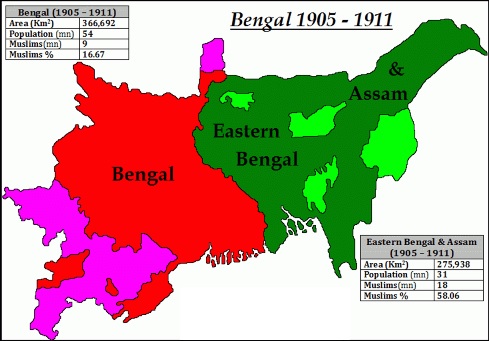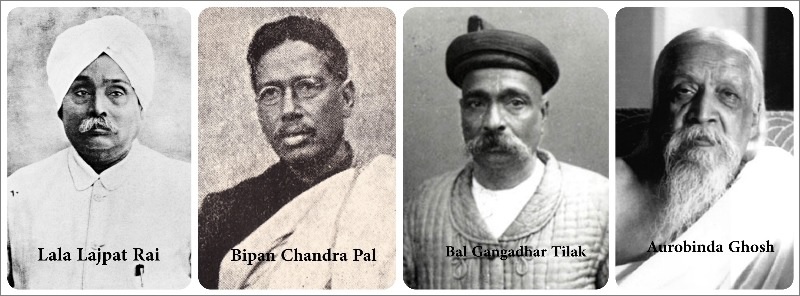Indian National Movements (1905 – 1916) – Swadeshi Movement, Rise of Extremism & Minto- Morley Reforms
by Devender
0 1559
Extremism was a phase that started in 1905 when people saw the failures of Moderates, Extremists were not happy with the way Moderates operated and they were more aggressive towards Britishers.
Causes for the Rise of Extremism
The moderates failed to get any kind of success against Britishers except the expansion of the legislative councils by the Indian Councils Act of 1892.
- In 1896, Indians faced a famine that happened all over the country
- During it, Moderates were not able to pursue the British to take Famine relief action
- Because of this, 90 lakh people died
- The Russo-Japanese war in 1904-05 where Japan defeated European power Russia also encouraged Indians to stand against European giants
- Another major cause of this rise was the rule of Curzon
- He reduced the control of local bodies with the Calcutta Corporation Act, 1899
- Then, he reduced the elected members in the University bodies and made them government departments
- He also reduced the freedom of people and press by the Sedition Act and the Official Secrets Act in 1904
- One of the biggest things he did was the partition of Bengal
- People had enough by then and were ready to stand against this torture
- The militant nationalists led by Tilak, Lajpat Rai, Bipin Chandra Pal, and Aurobindo Ghosh wanted to take the swadeshi movement outside Bengal and make it a political mass struggle for attaining Swaraj
- However, moderates were dominating INC at that time and they didn't want the movement to go this far
- So it became a movement where Indians boycotted foreign goods.
- These aggressive nationalists forced Dadabhai Naoroji to speak of Swaraj in the next session of INC in Calcutta in 1906
- The Extremists were encouraged by Dadabhai Naoroji's presentation.
- They called for passive opposition with swadeshi and boycotting Foreign goods
- Surat Split
- This led to the split of INC into two parts during the Surat session of Congress in 1907
- This is why it is known as the Surat Split of 1907
- Extremists left congress under the leadership of Tilak and others
- It promoted national education by setting national schools and colleges
- Farmers and industrialists didn't participate in this movement
- However, Students, women, and landlords actively participated
- Students even boycotted books made of foreign paper
- Government measures:
- Points to be Noted:
- Formation of the Muslim League:
- All-India Muslim League was set up on 30 December 1906
- It also conducted annual sessions and put its demands to Britishers
- Their first success was separate electorates for Muslims in the Minto-Morley reforms
- The decline of the Swadeshi Movement:
- Government oppression
- The movement didn't create an effective organization or political structure
- The movement became leaderless after most of the leaders were either arrested or deported
- Internal issues also harmed the movement
- The movement failed to reach masses
- Non-cooperation and passive resistance remained just ideas
- Bal Gangadhar Tilak:
- He was deported for 6 years in 1908 to Mandalay on the ground of sedition
- He set up the Home Rule League in 1916 at Poona
- He declared that "Swaraj is my birth-right and I will have it."
- He also built anti-imperialist feelings among people through Ganapati festivals and Shivaji festivals
- Valentine Shirol described him as the "Father of Indian Unrest"
- His famous books are The Arctic Home of Vedas & Gita Rahasya
- Lala Lajpat Rai:
- Bipin Chandra Pal:
- Aurobindo Ghosh:
- Their Objective, Methods & Achievements:
- The number of elected members in the Imperial Legislative Council and the Provincial Legislative Councils was increased
- Members to be elected indirectly
- The local bodies were to elect an electoral college, which would elect members of provincial legislatures, who would elect members of the central legislature
- Separate elections for Muslims
- Powers of legislatures both at the center and in provinces were increased
- Legislatures were allowed to pass resolutions, ask questions & supplementary, vote separate items in the budget but the budget as a whole could not be voted upon
- One Indian was to be appointed to the viceroy’s executive council and Satyendra Sinha was the first to be appointed in 1909
- Two Indians were appointed in England to the India Council.

Declaration of Swaraj & Beginning of Swadeshi Movement
The Swadeshi movement started as an anti-partition movement against the decision of partition of Bengal. INC conducted a meeting in 1905 under the presidency of Gokhale where it was decided that it will condemn the partition and stood against the policies of Curzon. It supported the Swadeshi movement of Bengal.
The opposition included boycott of government schools and colleges, government service, courts, legislative councils, municipalities, government titles, etc.
The moderates and extremists were not happy with each other ways. Moderates didn't like the extremist's way of demanding Swaraj, as they believed it can be achieved with constitutional methods.
Swadeshi Movement
It was also known as the Vandemataram movement and it was both a political and economic movement that involved boycotting of government service, courts, schools, and colleges and of foreign goods and promotion of Swadeshi goods.
The government forbids the cry of Vande Mataram and restricted public meetings. It even suppressed the freedom of the press and warned colleges to stop their students to take part in this movement. The students who were found guilty of participating were disqualified from government jobs and scholarships and disciplinary action such as fine, expulsion, arrest, etc. were taken against them. The government also arrested the extremist leaders Lal, Bal, Pal, and Ghosh and deported them.
Although some of the Muslims (Barrister Abdul Rasul, Liaqat Hussain, Guznavi, Maulana Azad) participated in the movement major rich and middle-class Muslims stayed away from it. They even supported the partition as it would provide them a Muslim majority in East Bengal. They formed an Organisation known as the All India Muslim League in 1907 as an anti-Congress front.
Muslim delegated from all over India met for the Muslim Educational Conference at Dacca Nawab Salimullah of Dacca took the advantage of the situation and proposed to set an organization that works for the interests of Muslims. Everybody accepted the proposal
The open phase of the movement was over by 1908 because of many reasons:
Aurobindo-Ghosh and Bipin Chandra Pal retired from politics and the movement only aroused people but didn't know how to express this energy.
Famous Extremist Leaders
He was titled Lokmanya and known as the founder of the popular anti-British movement in India. He used to attack Britishers through his weekly news articles The Mahratta and the Kesari. He collaborated with Agarkar to set up institutions for providing cheap education to people and started Akharas, Lathi clubs, and anti–cow killing societies.

He was titled Lion of Punjab and he founded the Home Rule League in the US in 1916. He was also deported to Mandalay on the grounds of sedition. He received fatal injuries during protests of Simon's commission and died after that on November 17, 1928.
He was moderate at the beginning of his political journey but became an extremist with time and he used to spread nationalism through his powerful speeches and writings.
He was also an extremist and participated in the Swadeshi movement, however, he was also arrested and after his release, he went to Pondicherry where he concentrated on spiritual activities.
Their main objective was to attain Swaraj or self-government.
They used the methods of no faith in the British sense of justice. They believed that political rights will have to be fought for and believed in non-corporation with the British Government by boycotting government courts, schools, and colleges. They promoted national education and Swadeshi goods by boycotting foreign goods.
Their achievements were that they became the first ones to demand Swaraj as a matter of birthrights and involve the masses in the freedom struggle. They organized the first mass movement that involved masses from all over India in the Swadeshi movement.
Minto- Morley Reforms of 1909
It is also known as the Government of India Act of 1909. In 1906, a group of Muslim elites called the Shimla deputation, led by Agha Khan met Lord Minto to demand separate electorates for Muslims. This group soon took over the All India Muslim League to show loyalty towards the crown and keep Muslims away from Congress. The important provisions of this Act were:

Share:







Comments
Waiting for your comments